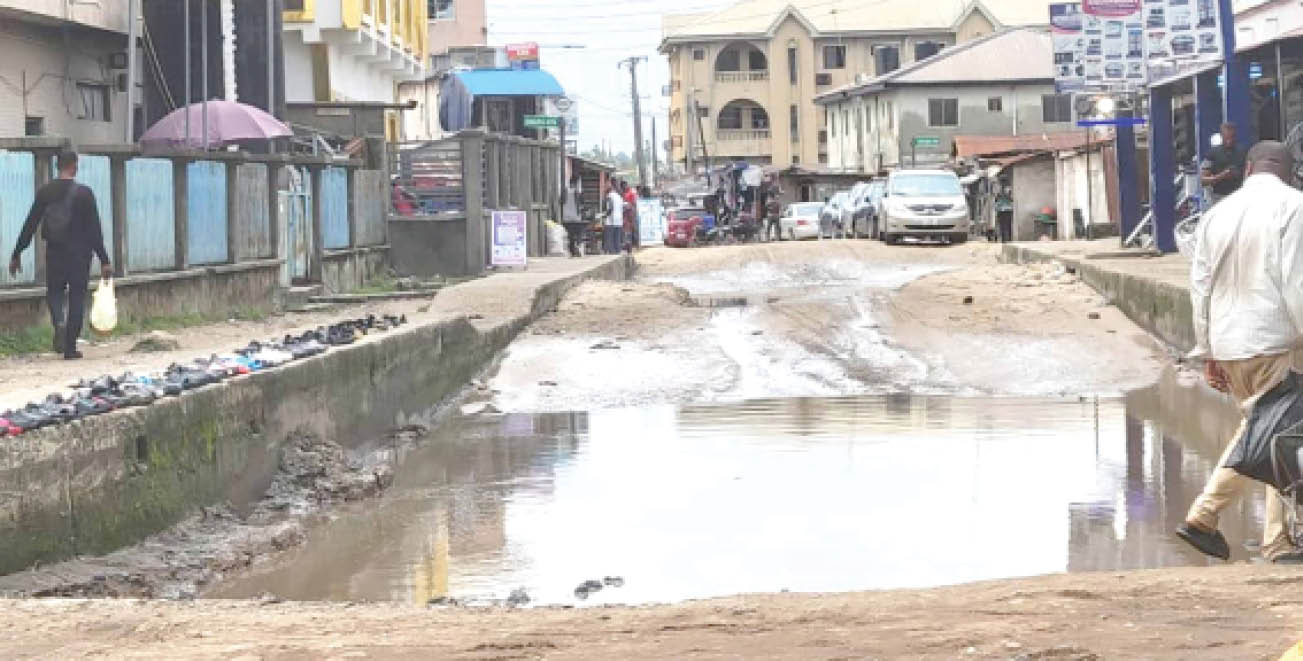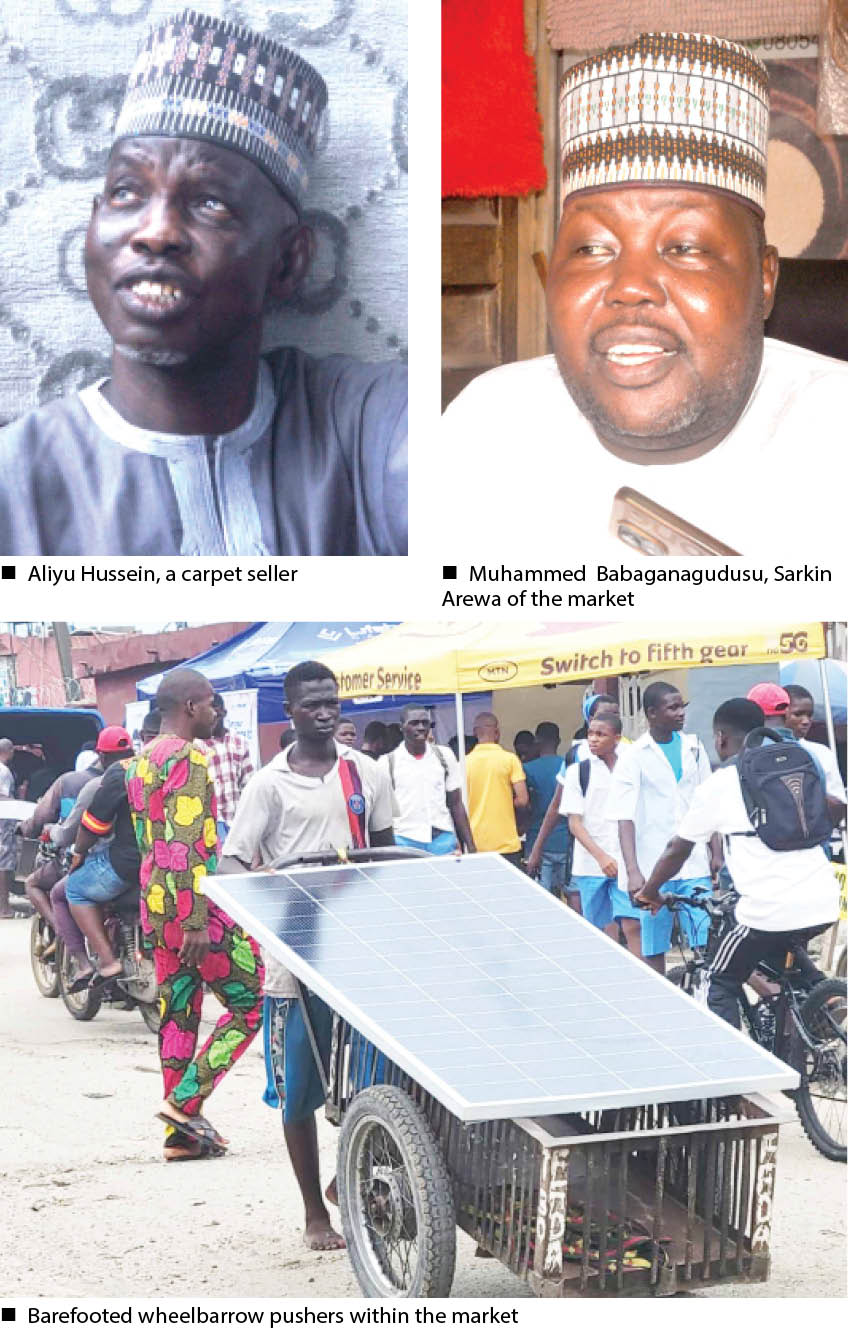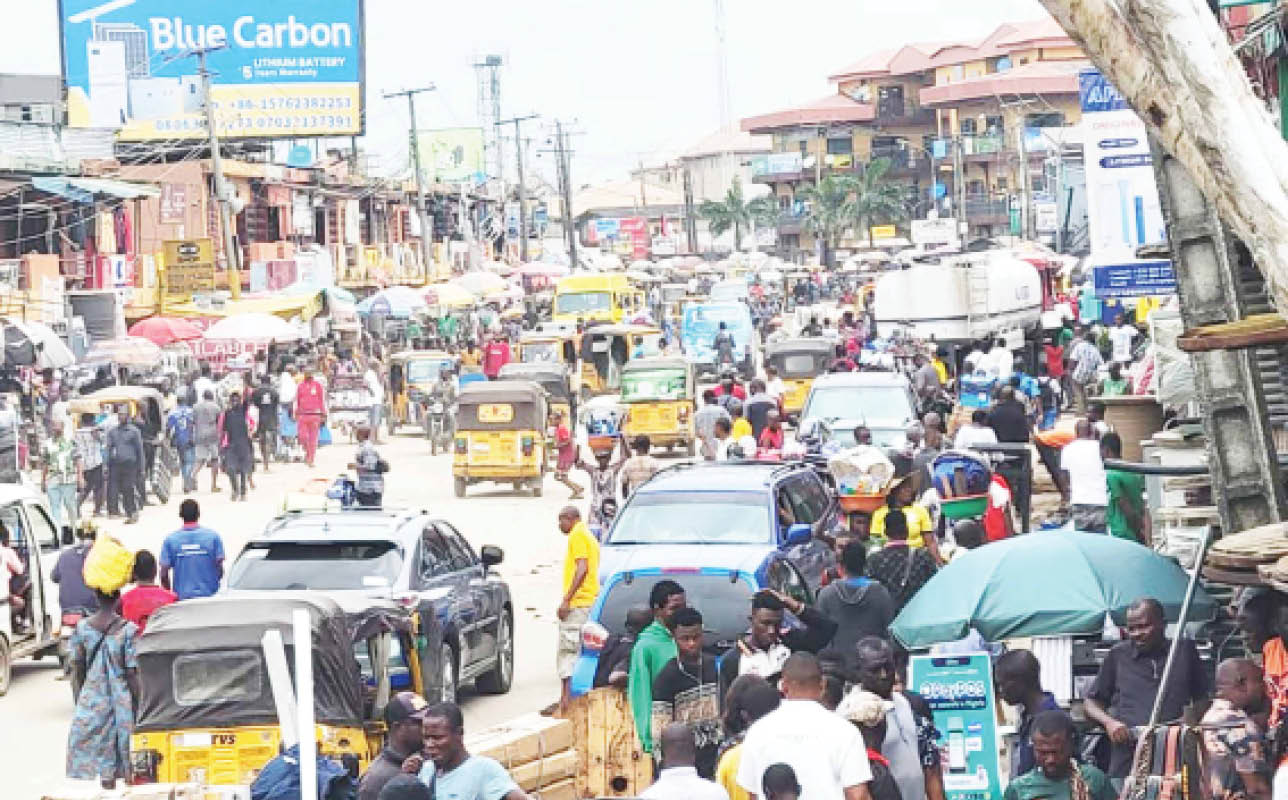The Alaba International Market in Lagos is reputed to be Nigeria’s largest and one of West Africa’s biggest electronic markets. Weekend Trust visited the electronic hub.
Except Sundays and some public holidays, the Alaba International Market, located in Ojo Local Government Area of Lagos State, is always a beehive of activities. A typical street market that evolved over five decades, the electronic hub offers opportunities for buyers and sellers of all kinds of electronics, such as computers, broadcast equipment, television sets, video gadgets, refrigerators, as well as generators, security equipment, household appliances etc.
Findings revealed that the market has over 5,000 shops, excluding attachments and sub-shops. And more than two million people transact business at the market daily.
Located on the Lagos-Badagry expressway axis, the market is patronised by people from neighbouring countries like Ghana and as far as East Africa, Togo and Benin Republic. It can be accessed from Badagry on the Badagry-Oshodi-Apapa expressway through Iyana Iba or Volks.
Apart from its huge contributions to revenue generation and the economy of Lagos State, the market reflects Nigeria’s cultural diversity, as you encounter people from various ethnic groups there.
Findings by Weekend Trust also revealed that the market breeds generations of traders as a number of businessmen and women have spent more than four decades in the facility.
In 2019, occupants and stakeholders of the market celebrated its 40-year anniversary.
In an old interview, one of the market’s founding fathers, Chief Christopher Chika Ajokorom, told this medium how it began by a simple act of faith by 13 young men of between 30 and 40 years of age and later blossomed into a sub-Saharan pride.

“When we started, nobody believed we would develop anything out of that wilderness. We started from Alaba-Suru, near Mile 2. The then government said we were operating close to an expressway and would hinder vehicular movement, so we had to move. But much later, the same state government, although of another administration, approved a market in the same area.
“Fortunately, we have made a huge success of our movement to this place,” Ajokorom said.
Describing the state of physical development in Ojo, during the formative days of the market, the businessman said, “Ojo was a sleeping hamlet,” adding that it was only heavy trucks conveying sharp sand to building sites that could go close to the area.
Weekend Trust reports that the market has evolved to be the biggest electronics hub in West Africa, metamorphosing from a greenfield site to a vast commercial zone, with patronage coming from places beyond Nigeria.
Apart from bustling trade, the Alaba International Market is also reputed as a centre of innovation and entrepreneurship as many successful businesses across the country started from the facility. Entrepreneurs with dreams and drive usually go to the market to make their marks and establish themselves in the business world.
At the heart of businesses at the market are technicians, artisans, wheelbarrow pushers, motorcyclists and tricyclists who convey customers in and outside the premises.
Also, haulers on barefoot, cart pushers, wheelbarrow operators and vendors who hawk the latest cellphones and accessories constantly roam the long streets of the market, while the big players occupy the major shops with their multi-billion naira electronic products thus, the international market reflects the major strata of the society.
Nnamdi Edeh, a phone repairer in the market, told Weekend Trust that the market accommodates traders from different parts of the country, and they have good relationship with one another.
Edeh, who has been in the market for eight years said, “Anything you want to buy – electronics, phone accessories – is available.”
40 years and counting
Malam Aliyu Hussein, a carpet and rug seller along Olojo Drive, told our correspondent that he had been doing business at the market for about four decades, adding that he had transferred business ideas to many generations.
He said, “I have been here for 40 years. I was single when I came, but got married a few years later.
“Alhamdulillah, we are doing our business and progressing. We don’t have problems with our fellow traders. I sell any type of carpet and rug; any type you want is available.”
Reflecting on the economy when he started and now, the Maiduguri- born businessmen said, “Things have really changed between then and now. You can’t compare those years to what we have now. But we thank God for everything.”
Also, Mohammed Babagana Qudusu, the Sarki and deputy head of Arewa at Ojo, told Weekend Trust that he inherited the carpet and rug business from his father.
He said, “I am into a carpet business introduced by my father; it was inherited.

“The business started here in the 1970s, but I started my own from 1996 till today.
“The experience is quite a lot. Things are changing everyday so it cannot be the same. We have experienced different changes. The challenge we have in the rug business is with the plain type, other types like centre rugs are moving. Even if you put tiles, you need a centre rug to beautify the house, so there is no challenge there.”
On relationship with other tribes, he said, “My relationship with the Yoruba and other tribes within the market is cordial. Let’s say I am the vice Olori Arewa of Ojo Kingdom; which shows you that I am one of them. The Kabiyesi has made us leaders of our people. Apart from the Arewa Kingdom, I am the district head of the Kanuri Council, representing Yobe, Borno and others. For now, I am the leader from here down to Badagry.”
On their contributions to the economy, he said, “It is quite a lot. We have paid our dues. We are law-abiding citizens, so we contribute a lot, even in our communities. We also contribute to peace.
“We cannot push everything to the government. You have to stand on your own to face and solve some of the challenges.”
His 22-year-old son and graduate of Biochemistry, Abdulqudus, who was also born into the business said, “There is nothing like business. No matter your skill or endeavour, knowledge in business is necessary. This is because there are many things you can learn; and the profit you make in business is more than what you get from office work.
“This is what saw me through school. And since we are now in a new generation, we have more opportunities to broaden the business through the social media in form of adverts and others,” he said.
Asked if he would take up the business fulltime, he said, “I can continue this business. I have offers in my school. They wanted to retain me because I am a first-class student, but I am trying to vary my choices; I am still thinking about it.”
Hit by economic crisis
Speaking with Weekend Trust, executive members of the international market, headed by Chief Camilus Amajuoyi, lamented that traders were worst hit by the present economic crisis in the country.
He lamented that the cost of doing business has tripled and governments at all levels have not given them any form of palliative or incentive in form of interest-free loans and other things that could help cushion the effects of the economic challenges they are facing.
“The cost of doing business has been rising as exchange rate keeps fluctuating, making it very difficult for any business man or woman to plan. The cost of duty payable at all country’s’ ports, as well as transporting our goods from point A to point B etc have increased astronomically, which has resulted in the sharp increase in prices of most goods and services today.
“These are the realities staring Nigerians in the face, both in the North, East, West and South”, he said.
Access road in terrible condition
When Weekend Trust visited the market, it observed that the only access road to it was in a bad state, making movement very difficult. And the situation has been worsened by flood.
In his statement, Amajuoyi noted, “The only access road to the Alaba International Market is in a very terrible and dangerous condition. And it poses great threat to the lives of citizens as heavy-duty trucks have fallen on that road several times, causing great damage, both to owners of goods and other road users.
“This and other people-oriented projects are what local, state and federal governments should focus on to help ameliorate the sufferings of the masses.”
‘Home of piracy’
Aside legitimate trade, the market is also regarded as a center of piracy in Nigeria. To an ordinary man on the streets, electronic business in Alaba is thriving, but behind it is piracy of all kinds.
Findings revealed that the piracy business, which started over 10 years ago, is still thriving in the market.
In 2017, Oludayo Tade and Okoro Paul Mmahi conducted a research published on ResearchGate, an academic social network titled, “Movie Piracy Networks at Alaba International Market, Lagos, Nigeria,” which examined the veiled chain of film piracy, a major crime in the Nigerian entertainment industry.
Studies on film piracy in Nigeria have also focused on the economic implication of piracy, both on copyright owners and the Nigerian economy. According to the research, narratives were extracted through in-depth interviews with pirates, marketers and producers.
“Data indicated that pirates were insiders in the film marketing industry and included importers of foreign movies, registered and unregistered retailers of Nigerian films, as well as marketers appointed by copyright owners to distribute their films.
“With the connivance of salesgirls working with copyright owners and dubbing companies, original copies of films (white face) are “procured.”
“Pirates distribute pirated copies, also secretly known as “green face,” without issuing receipts or putting the logo of the company on it. For security reasons, pirated films are sold only to buyers introduced by a member of the piracy network,” the study indicated.
The researchers also stated, “Efforts aimed at fighting piracy must take into account this veiled network to effectively combat intellectual theft via aggressive ban on the public sale of such products.”

 Join Daily Trust WhatsApp Community For Quick Access To News and Happenings Around You.
Join Daily Trust WhatsApp Community For Quick Access To News and Happenings Around You.


